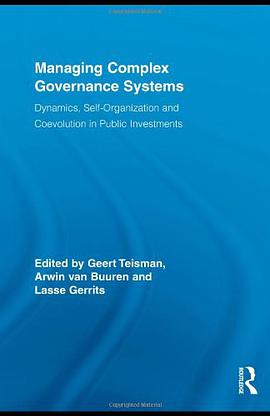

具体描述
Advances in public management sciences have long indicated the empirical finding that the normal state of public management systems is complex and that its dynamics are non-linear. Complex systems are subject to system pressures, system shocks, chance events, path-dependency and self-organisation. Arguing that complexity is an ever-present characteristic of our developed societies and governance systems that should be accepted, understood and adopted into management strategies, the original essays collected in this book aim to increase our understanding of complex governance processes and to propose new strategies for how public managers can deal with complexity in order to achieve high-quality research. The authors collected here use theoretical frameworks grounded in empirical research to analyze and explain how non-linear dynamics, self-organisation of many agents and the co-evolution of processes combine to generate the evolution of governance processes, especially for public urban and metropolitan investments. Managing Complex Governance Systems: Dynamics, Self-Organization and Coevolution in Public Investments offers readers an increased understanding of the main objective of public management in complexity--namely complex process system--and a strategy for accepting and dealing with complexity based on the idea of dual thinking and dual action strategies satisfying the desires of controlling processes and the need to adjust to changes simultaneously.
作者简介
目录信息
读后感
评分
评分
评分
评分
用户评价
如果说市面上大多数管理学书籍都在教你如何“建造”一座坚固的堡垒,那么这本书则是在教你如何与“周围的河流共存”。它关注的焦点是“系统漂移”和“边缘效应”。我发现,在讨论治理系统时,我们往往过度关注核心的指挥中心,却忽视了系统最外层的那些微小、但持续的互动如何最终塑造了整体的走向。这本书对“反馈回路”的分析极具穿透力,它揭示了不良的治理习惯是如何通过隐性的、重复的交互路径被不断强化的,最终形成难以撼动的“路径依赖”。它没有提供操作手册,因为它深知,每个系统都是独一无二的。它提供的是一种深刻的洞察力,让你能够自己去解构自己的系统,理解那些看似随机的故障或成功背后隐藏的深层逻辑。这本书更像是一本关于“系统诊断学”的入门指南,对于希望进行深层次组织变革的人来说,绝对是醍醐灌顶之作。
评分我是一位长期从事跨国项目协调工作的专业人士,多年来我一直在努力寻找一个能解释不同地域、不同法律体系下项目如何“粘合”在一起的理论框架。这本书的视角极大地拓宽了我的视野。它没有局限于单一国家的治理模式,而是将目光投向了“超国家”或“跨界”的治理挑战。作者对“多重合法性”的探讨尤为精辟,在一个全球化的背景下,一个决策往往需要同时满足来自监管机构、股东、公众舆论乃至地方社区的多种、有时甚至是相互冲突的要求。这本书教会我的,是如何在这些“合法性光谱”中找到最小公约数,而不是执着于寻找一个绝对正确的答案。它不是教你如何“赢”,而是教你如何在多方博弈中达成一种“可持续的妥协”。这种实战性的哲学思辨,让我对未来复杂项目管理的工作方式有了全新的定位。
评分这本书简直是为那些在“僵化”与“失控”之间挣扎的组织领导者量身定做的。我们都知道,制度是必要的,但过度依赖制度往往会导致反应迟钝和创新停滞。这本书没有提供一个“万能公式”来消除复杂性——事实上,它明确指出复杂性是治理的内在属性,试图消灭它只会带来更大的灾难。相反,它提供的是一套“共存之道”。我特别欣赏作者对于“冗余”和“低效率”的辩护,指出在某些关键时刻,这些看似浪费的资源恰恰是系统韧性的来源。这与当下追求极致效率的商业文化形成了鲜明对比,却发人深省。读这本书,就像是进行了一次深刻的“反向教育”,它挑战了许多我们奉为圭臬的管理信条。对我来说,它更像是一面镜子,照出了我们在追求“清晰”和“控制”时,常常忽略了系统固有的动态美感和自组织能力。
评分这本书的视角真是太独特了,它让我重新审视了我们习以为常的那些组织结构和决策流程。我一直觉得,在大型的跨部门合作中,最让人头疼的不是技术难题,而是那些看似“无形”的权力博弈和信息孤岛。这本书深入剖析了这些“复杂性”的根源,它没有落入那种空泛地喊口号的窠臼,而是通过一系列扎实的案例,展示了在不同文化背景和管理体系下,治理结构是如何自我演化,甚至是自我阻碍的。尤其是关于“弹性边界”的讨论,非常启发我思考,如何在保持既有框架稳定性的同时,又能让系统具备足够的柔韧性去应对突发状况。那种将治理视为一个动态生态系统的观点,彻底打破了我过去那种线性和层级化的思维定势。读完之后,我发现自己看问题的角度都变得更加立体了,不再只关注“谁说了算”,而是更关注“信息是如何流动的”以及“利益是如何被分配和再分配的”。对于任何身处复杂决策网络中的管理者来说,这本书都是一本不可多得的“内部地图”。
评分老实说,我一开始是被书名吸引的,因为它听起来非常“学术化”,但实际阅读体验却出乎意料地流畅且富有洞察力。这本书最让我印象深刻的地方,在于它对“非正式权力网络”的描绘。在许多大型机构中,真正的决策往往不是通过正式的会议纪要或组织架构图来完成的,而是隐藏在咖啡间的闲聊、非公开的邮件往来,甚至是资深员工之间心照不宣的默契之中。作者似乎拥有某种“透视眼”,能够精准地捕捉到这些潜藏的张力与联盟。它提供了一套工具,帮助我们去识别和理解这些“阴影治理”是如何影响最终成果的。我特别喜欢作者对“信任资本”的论述,认为信任不仅仅是一种美德,更是一种关键的治理资源。这种将社会学概念与管理实践紧密结合的处理方式,使得原本枯燥的理论变得鲜活起来,也让我对日常工作中的人际互动有了更深刻的理解和更审慎的态度。
评分 评分 评分 评分 评分相关图书
本站所有内容均为互联网搜索引擎提供的公开搜索信息,本站不存储任何数据与内容,任何内容与数据均与本站无关,如有需要请联系相关搜索引擎包括但不限于百度,google,bing,sogou 等
© 2026 book.wenda123.org All Rights Reserved. 图书目录大全 版权所有




















